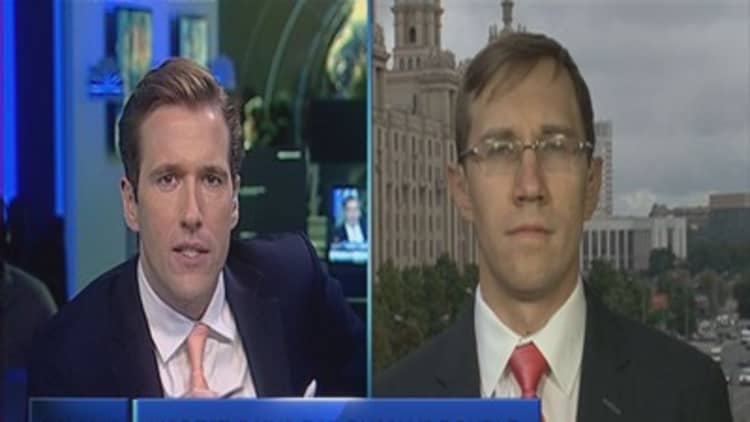Russia's central bank left its key interest rate unchanged on Friday, taking a pause in aggressive monetary easing as renewed weakness in the ruble pushes up inflation.
The central bank left its main rate unchanged at 11 percent following its latest monetary policy meeting, a move widely expected by economists.
In a statement, the central bank said that currency moves had impacted inflation and inflation expectations, which were both on a rising trend.
The Russian ruble has declined almost 10 percent since the central bank last met in late July, fueling inflation which is running at an annual rate of almost 16 percent.
Russia has slashed rates a hefty 600 basis points so far this year to spur growth in an economy battered by a rout in oil prices and sanctions from the West for intervention in Ukraine.
"The recent fall in the ruble underlines just how reliant the Russian economy is on oil, so the central bank is likely to remain cautious," William Jackson, senior emerging markets economist at Capital Economics in London, told CNBC.
"Unless there is a marked rally in the ruble, rates should remain steady."
The Russian currency was trading at about 68 to the dollar on Friday. It has shed some 80 percent of its value in the past year.
The weak currency, which pushes up the price of imported goods, makes it difficult to cut interest rates further and support economic growth.
"The central bank and government are between a rock and hard place -- they would like to get rates down further and help growth but if they do that the danger is they might lose control of inflation and the ruble could fall further," Chris Weafer, a senior partner at Macro Advisory, told CNBC following the Russian rate decision.
"So they need the ruble to settle and concerns about China and emerging markets to settle down as well," he added.
Russia relies on oil and gas revenue for about half of its budget revenue, so a halving in oil prices over the past year has hit the country hard.
Russia's economy contracted 4.6 percent in the second quarter from a year earlier, following a decline of 2.2 percent in the first quarter.
"The oil price environment means another world for Russia and we will see a big contraction in growth as the economy makes a painful adjustment," said Oleg Kouzmin, an economist at Renaissance Capital in Moscow, speaking to CNBC's World Wide Exchange earlier on Friday.
"But if oil stays in the $50-$60 range next year we should see no further contraction in growth; it would be bad if oil drops to $40 and stays there but that looks unlikely," he added.

Russia and other major emerging markets face a testing time as global markets brace for the first rise in U.S. interest rates in almost a decade — possibly when the Federal Reserve meets next week.
"There might be further capital outflows from Russia if the Fed hikes rates," said Jackson at Capital Economics. "More important is what happens to the price of oil."
Follow us on Twitter: @CNBCWorld




